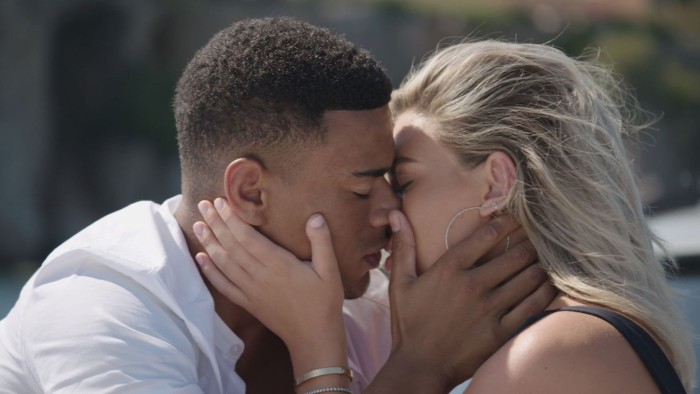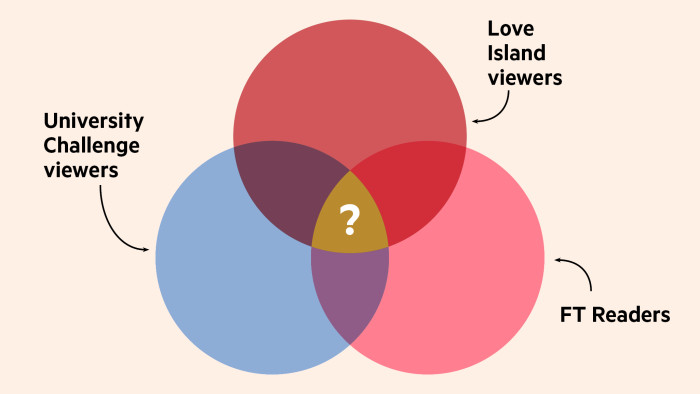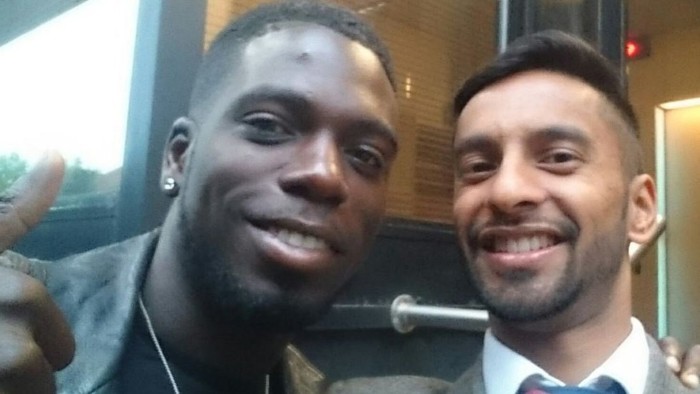The maths of ‘Love Island’


Roula Khalaf, Editor of the FT, selects her favourite stories in this weekly newsletter.
As a secondary school maths teacher, one of my favourite GCSE lessons is teaching my students about Venn diagrams. Picture this: one circle representing the set of viewers of the BBC2 quiz show University Challenge and another for viewers of ITV2’s Love Island. The intersection between the two circles identifies viewers of both programmes. I’ll raise my hand to admit that I fall — unashamedly — into this middle category.
Using purely anecdotal and thus unscientific research based on the responses of my Twitter followers to my #LoveIsland tweets, this intersection contains more people than you might think.
Many of my followers are also readers of the Financial Times. I’d be intrigued to find out the answer to: P(University Challenge viewer ∩ Love Island viewer ∩ Financial Times reader) — the probability of bumping into someone who intersects all three circles.
For those of you who have been hiding behind an encyclopedia all summer, Love Island is a reality dating show where ridiculously buff young singletons attempt to find true love in a Mallorcan villa. In this Orwellian world, every glance, snog and dumping is filmed 24/7.
It may not sound like the kind of programme watched by serious financial types — certainly, some FT readers were aghast when economics editor Chris Giles wrote about the series last week. But the ruminations of beautiful people, some of whom have never heard of Brexit, is a blissful escape from the stress of everyday life. I happen to know that the FT Lex team are avid viewers (although they claim to watch it “semi-ironically”).

So it’s no surprise that Love Island regularly pulls in over 3m viewers. Coincidentally, when the University Challenge team I captained, Emmanuel College Cambridge, was defeated in an epic semi-final battle by Eric Monkman-led Wolfson College Cambridge last year, the TV audience was upwards of 3.1m.
What could link the unknown audience number at the centre of my Venn diagram? These viewers may be seeking a respite from depressing news, or enjoy sharing acid sharp commentary via social media as they watch (#LoveIsland has been trending all week in the build-up to Monday night’s final).
But we shouldn’t discount the importance of love and romance. Sure, we can use our smartphones to criticise Love Island contestants, but we increasingly rely on them to find love for ourselves. A quarter of new relationships are thought to start online, and an estimated £300m is spent annually in the UK.
I started watching Love Island last year as a sociological experiment to understand the hype (and make sense of all the classroom banter about it). Since then, I have “coupled up” with the show every night at 9pm — even grabbing a selfie with 2017 contestant Marcel Somerville, formerly of hip hop group Blazin’ Squad.
Super fans like me are known as being “loyal” to the show, in honour of contestant Georgia Steel, and a huge commercial venture has sprung up to feed our addiction. This includes Primark T-shirts displaying the #Loyal slogan.
I have purchased an official Love Island water bottle, branded with “Seagull” in the show’s inimitable bright pink font. I also wear the official wristband showing my current relationship status as “single”. Should this change, I can flip it over to say “coupled up”. But what is the probability of this happening?
I have used an adapted version of Drake’s equation — a mathematical framework to estimate the number of alien civilisations in our galaxy — to estimate how many women I could date. Using the power of maths, I have estimated there are potentially 73 women out there for me. Assuming they are all in the UK (population circa 66.5m) the odds of meeting one is one in 910,000. I have not yet attempted to calculate the odds of any of them being West Ham fans. Instead, I have pondered whether any of the Islanders will find their soul mate.
Research by eHarmony, the dating site, shows that one in five people under 35 believe in the concept of “the one”. Yet the numbers don’t look good. Considering that about 107bn people have ever lived, and the current global population of 7.6bn, this means that 93 per cent of humans ever born are deceased. If we are born with one predestined soul mate in humanity, the odds make grim reading for the Islanders. There is a whole chapter in my forthcoming book, The Life Changing Magic of Numbers, devoted to the maths of love.
Still, they can console themselves with the £50,000 prize money. The triumphant couple was “Jani” (Jack Fincham and Dani Dyer, daughter of TV hard man actor Danny Dyer). They have been coupled up since day one, and made it to day 58 of the final. Considering contestants are under constant surveillance, that is 1,392 hours (58 days x 24 hours). As they decided to split the pot, this is equivalent to an hourly wage of £17.95 (£25,000/1,392 hours).
Not bad for lounging beside a pool — but the real riches lie beyond the show. There are already rumours that “Jani” will get to front their own TV show.
The impact of future sponsorship deals has led consultancy Frontier Economics to estimate expected earnings of Islanders over the next five years to be £1.1m, rising to £2.4m for the winners over the same period. With likely earnings positively correlated to the length of a contestant’s villa stay, income will primarily be derived from appearance fees and sponsored Instagram posts. Former contestants have an average of 600,000 followers, meaning some can command about £8,000 per Instagram post.
This is impressive, considering numeracy skills aren’t the Islanders’ forte. Piers Morgan, the host of ITV’s Good Morning Britain, loves to test the maths of dumped Islanders who wash up on his sofa. He has quizzed them on times tables (15 x 11) and geometry, asking them to recite Pythagoras’ Theorem and pi to five decimal places. The Islanders couldn’t get these right.
However, some have claimed that Love Island is tougher to get into than Oxbridge. There were 85,000 applications for the 2018 series, compared with 37,000 undergraduate applications for Oxford and Cambridge. A sensational headline, but I would tell my GCSE students that is a case of “lies, damned lies and statistics”.
The pool of eligibility for Love Island far outweighs Oxbridge, so it is not a like-for-like comparison. While ITV rules state only that you have to be over 18 to apply, only one of this season’s 38 Islanders is beyond 30 (Paul Knops, who snogged pop icon Britney Spears in her 2016 video Make Me).

There are 11.2m UK residents aged 18-30, according to the latest Office for National Statistics estimates — considerably larger than the typical Oxbridge undergraduate application pool of 17-18-year-olds who graft hard enough to meet the high entry requirements.
Who would like to estimate the odds of an Oxbridge graduate getting to the 2019 Love Island final? ITV is already accepting applications for the next series. On my last appearance on the Good Morning Britain sofa, I was asked if I would ever apply myself. I said probably not, but if there was ever a Love Island for nerds, then maybe I’d stand a chance.
Bobby Seagull is secondary school maths teacher and a doctoral student at the University of Cambridge researching maths anxiety. He is a quiz enthusiast, having captained the Emmanuel College team on the BBC’s University Challenge, and a long-suffering West Ham fan. A chartered accountant and a former trader at an investment bank, his book “The Life Changing Magic of Numbers” is released this autumn. Twitter: @Bobby_Seagull Instagram: @Bobby_Seagull
Comments